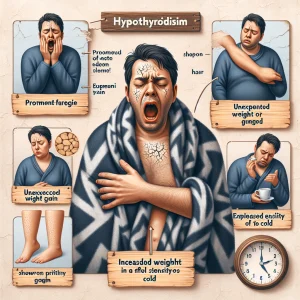Identify and Comprehend the Impactful Signs and Symptoms of Hypothyroidism to Enhance Your Health
Hypothyroidism is a critical health issue that occurs when the thyroid gland fails to produce sufficient levels of vital thyroid hormones. This small, butterfly-shaped gland located at the front of the neck is integral to regulating various bodily functions, including metabolism, energy levels, and overall well-being. When the thyroid is underactive, it triggers a series of physiological changes that can affect nearly every system in your body. The primary hormones involved—thyroxine (T4) and triiodothyronine (T3)—are essential for maintaining healthy metabolic rates. A reduction in their production can lead to significant drops in energy, fluctuations in weight, and a general decline in health, underscoring the importance of recognizing and understanding the wide-ranging effects of this condition.
Hypothyroidism can stem from various factors, including autoimmune disorders like Hashimoto’s thyroiditis, certain medications, past radiation treatments, or even an iodine deficiency. Understanding the risk factors and symptoms associated with hypothyroidism is vital, as they can profoundly affect your health and quality of life. Often called the body’s “metabolic engine,” any slowdown in thyroid function can disrupt metabolism, manifesting as weight gain, persistent fatigue, and other debilitating symptoms. It’s important to note that hypothyroidism is more frequently diagnosed in women and its prevalence tends to increase with age. By recognizing these signs and symptoms, you can seek timely medical intervention and access effective treatment options.
Key Insights and Essential Information About Hypothyroidism You Must Understand
- Hypothyroidism is characterized by insufficient hormone production from the thyroid gland, leading to a diverse range of physical and psychological symptoms.
- Some common symptoms of hypothyroidism include fatigue, weight gain, dry skin, and increased sensitivity to cold, among others.
- Physical signs may also manifest as hair loss, joint pain, and muscle weakness, which can significantly impact daily activities and overall quality of life.
- Emotional and psychological effects can vary from depression and anxiety to difficulties with focus and concentration, potentially exacerbating mental health challenges.
- Identifying hypothyroidism in children and adolescents can be especially tricky, as symptoms may include growth delays, delayed puberty, or academic difficulties.
- Diagnosis typically involves blood tests to measure levels of thyroid hormones and thyroid-stimulating hormone (TSH).
- The standard approach to treating hypothyroidism often includes synthetic thyroid hormone medications that help compensate for the insufficient hormone production.
- Incorporating lifestyle changes, such as a nutritious diet, regular exercise, effective stress management, and prioritizing quality sleep, can significantly improve the management of hypothyroidism.
 Recognize the Common Symptoms of Hypothyroidism in Your Everyday Life
Recognize the Common Symptoms of Hypothyroidism in Your Everyday Life
Throughout your daily routine, you may encounter various symptoms that could signal an underactive thyroid. A prevalent complaint among individuals suffering from hypothyroidism is an overwhelming sensation of fatigue. Many report feeling inexplicably exhausted even after a full night’s sleep, which can drastically diminish motivation and hinder daily tasks. This unrelenting fatigue not only impacts physical health but also disrupts emotional balance and overall productivity, leading to frustration and other potential health complications.
Besides fatigue, unexpected weight gain is another common symptom to watch for. Individuals may notice an increase in body weight despite adhering to a healthy diet and exercise routine. This frustrating weight gain often results from a sluggish metabolism due to reduced thyroid hormone levels. Additional symptoms may include increased sensitivity to cold, dry skin, hair loss, and constipation. Recognizing these early indicators is crucial, as it allows for timely medical intervention and effective management of this condition.
Delve into the Physical Symptoms Associated with Hypothyroidism
The physical symptoms associated with hypothyroidism can vary significantly and can have a profound impact on your daily life. One of the most frequently reported signs is a noticeable decline in skin and hair health. Many individuals describe experiencing dry, rough, and flaky skin that can feel uncomfortable and irritating. Hair may become brittle and prone to excessive shedding, leading to worries about personal appearance and self-esteem, which can further impact mental well-being.
Another physical manifestation to be aware of is myxedema, which presents as swelling, particularly in the face or around the eyes. This condition results from the accumulation of mucopolysaccharides in the skin, producing a puffy appearance that can be distressing. Muscle weakness and joint pain are additional common complaints for those diagnosed with hypothyroidism. Discomfort and stiffness in muscles and joints can limit participation in activities once enjoyed. Therefore, recognizing these physical signs is vital for understanding the broader implications of hypothyroidism on your body and overall quality of life.
Investigate the Emotional and Mental Health Effects of Hypothyroidism
Hypothyroidism not only affects physical health but also has significant repercussions on emotional and mental well-being. Many individuals coping with this condition often report feelings of depression or heightened anxiety that seem disproportionate to their actual life circumstances. You may find yourself experiencing persistent sadness or a lack of motivation without a clear cause. If these feelings persist, they can become particularly concerning and highlight the condition’s deeper impact on mental health.
Cognitive functions are frequently diminished, with many individuals describing experiences commonly referred to as “brain fog.” This cognitive decline manifests as difficulties in concentration, forgetfulness, and a general sensation of mental sluggishness. Such cognitive challenges can interfere with daily responsibilities, complicating the management of tasks both professionally and personally. Acknowledging these emotional and mental health symptoms associated with hypothyroidism is crucial for seeking appropriate support and treatment needed to improve your overall quality of life.
 Identify Hypothyroidism Symptoms in Children and Adolescents for Prompt Intervention
Identify Hypothyroidism Symptoms in Children and Adolescents for Prompt Intervention
Hypothyroidism affects not only adults but can also have significant consequences for children and adolescents, often presenting symptoms differently than in adults. In younger individuals, signs may not always be overtly visible. For example, you may notice indicators such as growth delays or difficulties concentrating in school. These signs can easily be misinterpreted as typical childhood behavior or common developmental delays, making it essential for parents and guardians to stay alert and proactive.
In addition to concerns regarding growth, children diagnosed with hypothyroidism may also experience excessive fatigue or lethargy, which can severely impact their participation in physical activities and social interactions with peers. Mood swings and irritability are also commonly noted, as hormonal imbalances can disrupt emotional regulation. If you suspect that your child may exhibit symptoms of hypothyroidism, consulting with a healthcare professional for a thorough evaluation and testing is vital to ensure their health and developmental progress are adequately monitored.
Grasp the Significance of Thyroid Function Tests in Diagnosing Hypothyroidism
The Critical Role of Thyroid Function Tests in Identifying Hypothyroidism
The diagnosis of hypothyroidism typically begins with thyroid function tests, which are essential for evaluating the health of your thyroid gland. The most commonly performed tests measure levels of Thyroid-Stimulating Hormone (TSH) and free thyroxine (T4). The pituitary gland produces TSH, which is essential for signaling the thyroid to produce T4. Elevated TSH levels can suggest that the thyroid is underactive and struggling to generate adequate hormones, indicating the potential presence of hypothyroidism.
Understanding Thyroid Test Results for Accurate Hypothyroidism Diagnosis
Simultaneously, assessing T4 levels is crucial for determining the severity of hormonal deficiency. When blood tests show elevated TSH levels alongside low T4 levels, this combination often confirms a diagnosis of hypothyroidism. Understanding these tests’ nuances can help alleviate concerns and clarify your thyroid health, empowering you to take informed actions toward treatment.
Empower Yourself with Knowledge About the Hypothyroidism Diagnostic Process
Enhancing your understanding of the diagnostic process not only broadens your knowledge but also empowers you as you navigate your health journey. Being informed about how thyroid function tests work and what they reveal about your body facilitates more effective discussions with your healthcare provider, enabling proactive management of your health and well-being.
 Explore Comprehensive Treatment Strategies for Effective Management of Hypothyroidism
Explore Comprehensive Treatment Strategies for Effective Management of Hypothyroidism
Upon receiving a diagnosis of hypothyroidism, various treatment options are available to help you manage the condition effectively. The most commonly employed method is hormone replacement therapy, which typically involves synthetic levothyroxine. This medication mimics the natural function of thyroid hormones, helping to restore normal hormone levels, alleviate symptoms, and enhance overall well-being.
Your healthcare provider will collaborate closely with you to determine the appropriate dosage tailored to your specific needs and how your body responds to the treatment. Regular monitoring through blood tests is vital to ensure your hormone levels remain within the target range. Maintaining open communication with your healthcare team regarding any changes in your symptoms or potential side effects is essential for optimizing your treatment experience and achieving the best possible health outcomes.
Incorporate Lifestyle Modifications for Optimal Management of Hypothyroidism
In addition to medication, making specific lifestyle changes can significantly enhance your ability to manage hypothyroidism effectively. A balanced diet focusing on whole foods can support thyroid function and overall health. Including foods rich in iodine, selenium, and zinc—such as fish, nuts, seeds, and leafy greens—provides essential nutrients necessary for optimal thyroid performance and hormone production.
Moreover, engaging in regular physical activity is crucial for maintaining a healthy weight and boosting energy levels. Moderate exercise can alleviate fatigue, elevate your mood, and improve cognitive function, thus contributing to an overall sense of well-being. Prioritizing good sleep hygiene is equally important; aiming for 7-9 hours of quality sleep each night supports hormonal balance and overall health.
By gaining a deeper understanding of hypothyroidism and its effects on both physical and emotional well-being, you empower yourself to take control of your health journey. With the right approach to diagnosis, consistent management, treatment options, and lifestyle changes, you can navigate this condition confidently. Remember, you are not alone on this journey; seeking support from healthcare professionals and loved ones can significantly enhance your path toward achieving optimal health.
Frequently Asked Questions About Hypothyroidism
What are the most common symptoms linked to hypothyroidism?
Some prevalent symptoms associated with hypothyroidism include fatigue, weight gain, constipation, dry skin, hair loss, sensitivity to cold, muscle weakness, and depression.
Can hypothyroidism cause irregular menstrual cycles?
Yes, hypothyroidism can lead to changes in menstrual cycles, which may manifest as irregular periods, heavy bleeding, or even missed periods altogether.
Is hair loss a common symptom of hypothyroidism?
Hair loss is frequently observed in individuals with hypothyroidism, often presenting as thinning hair, brittle strands, or noticeable bald patches.
Can hypothyroidism contribute to weight gain?
Yes, hypothyroidism can lead to weight gain due to a slowed metabolic rate and potential fluid retention in the body.
What mental health symptoms are linked with hypothyroidism?
Mental health symptoms associated with hypothyroidism may include depression, anxiety, irritability, and difficulties with concentration.
Can hypothyroidism result in muscle weakness?
Yes, individuals affected by hypothyroidism often experience muscle weakness and discomfort, which can hinder daily activities and exercise routines.
Is cold sensitivity a common symptom of hypothyroidism?
Yes, heightened sensitivity to cold is a typical symptom of hypothyroidism, often associated with a lower basal metabolic rate and reduced heat production within the body.
Can hypothyroidism cause dry skin?
Yes, hypothyroidism can lead to dry and itchy skin due to decreased oil production and reduced sweating, resulting in discomfort and irritation.
Presented BY: Hypothyroid Blood Tests
Hypothyroidism Symptoms: Key Signs to Recognise Was First Published By https://bloodtest.co.uk
Find Us On Facebook: EZ Blood Tests
The Article: Hypothyroidism Symptoms: Essential Signs to Identify appeared first on: https://ezbloodtest.com
The Article Hypothyroidism Symptoms: Key Signs You Should Recognize Was Found On https://limitsofstrategy.com
It’s inspiring to see a piece that delves into the complexities of hypothyroidism, a condition that, despite its prevalence, often flies under the radar in discussions about overall health. Your exploration of how the thyroid functions and the ripple effects of its underactivity resonates deeply with me, particularly because my own journey with thyroid issues has opened my eyes to the interconnectedness of our bodily systems.